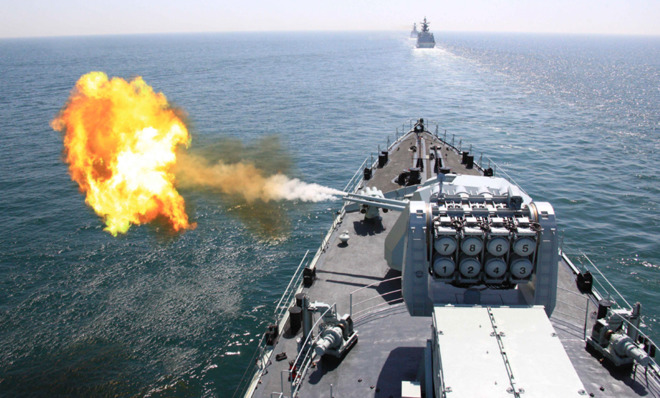This is how the U.S. thinks China could invade Taiwan
But what if Beijing has other ideas?

A free daily email with the biggest news stories of the day – and the best features from TheWeek.com
You are now subscribed
Your newsletter sign-up was successful

A Pentagon report from earlier this year lays out China's military options for invading Taiwan. And while a huge amphibious assault is one possibility for "reunifying" Taiwan with mainland China, Beijing's burgeoning arsenal gives it plenty of other options.
The invasion analysis is part of the latest edition of the Pentagon's annual report on China's military capabilities and strategy. It doesn't just reflect an assessment of China's military options. It also reflects how the U.S. — which could in theory go to war with China in order to stop an invasion of Taiwan — views the advantages and disadvantages of those options.
The report presents four military options in escalating order of force.
The Week
Escape your echo chamber. Get the facts behind the news, plus analysis from multiple perspectives.

Sign up for The Week's Free Newsletters
From our morning news briefing to a weekly Good News Newsletter, get the best of The Week delivered directly to your inbox.
From our morning news briefing to a weekly Good News Newsletter, get the best of The Week delivered directly to your inbox.
Naval blockade. China could starve out Taiwan, which imports much of its food and fuel. Beijing could compel ships to stop in mainland ports for inspection. Or, the Chinese Communist Party could declare the waters around Taiwan to be live-fire training zones, discouraging ships from entering, just as it did in 1995.
"China today probably could not enforce a full military blockade," the Pentagon concludes. "However, its ability to do so will improve significantly over the next five to 10 years."
Limited force. China could unleash cyber-warfare or raids by Special Operations Forces "against Taiwan's political, military, and economic infrastructure to induce fear in Taiwan and degrade the populace's confidence in the Taiwan leadership."
Air and missile attacks. "China could use missile attacks and precision strikes against air defense systems, including air bases, radar sites, missiles, space assets, and communications facilities to degrade Taiwan's defenses, neutralize Taiwan's leadership, or break the Taiwan people's will to fight."
A free daily email with the biggest news stories of the day – and the best features from TheWeek.com
Amphibious invasion. There are actually a couple of options here. China is currently capable of grabbing, with little overt preparation, Taiwanese islands such as Pratas, Itu Aba, Matsu, or Jinmen, according to the Pentagon's assessment.
Or the Chinese could simply launch an all-out seaborne assault to seize a beachhead and eventually take over the whole of Taiwan proper. But international condemnation, combat attrition, and urban warfare and counterinsurgency in Taiwanese cities could make the attempt risky.
In fact, all of these options carry political risks for China in terms of international political and economic pressure. Some sound like they could backfire.
Given that attempts during World War II and Vietnam to bomb enemy populations into submission not only failed, but often solidified popular support for the target government, a Chinese bombardment of Taiwan's cities could harden Taiwanese determination to resist reunification.
But there's another interesting aspect to this report. While the Pentagon says its analysis is based on publicly available Chinese documents, these four options seem to be essentially American. Blockade, missile strikes, and limited and full-scale invasions have been U.S. practice since 1945 everywhere from Cuba and Iraq to Panama and Afghanistan.
Which doesn't mean China won't use them. But one wonders if Beijing may devise a more creative solution to its Taiwanese "problem."
From drones to AKs, high technology to low politics, War is Boring explores how and why we fight above, on, and below an angry world. Sign up for its daily email update here or subscribe to its RSS Feed here.
More from War is Boring...
-
 The week’s best photos
The week’s best photosIn Pictures An explosive meal, a carnival of joy, and more
-
 The ‘ravenous’ demand for Cornish minerals
The ‘ravenous’ demand for Cornish mineralsUnder the Radar Growing need for critical minerals to power tech has intensified ‘appetite’ for lithium, which could be a ‘huge boon’ for local economy
-
 Why are election experts taking Trump’s midterm threats seriously?
Why are election experts taking Trump’s midterm threats seriously?IN THE SPOTLIGHT As the president muses about polling place deployments and a centralized electoral system aimed at one-party control, lawmakers are taking this administration at its word